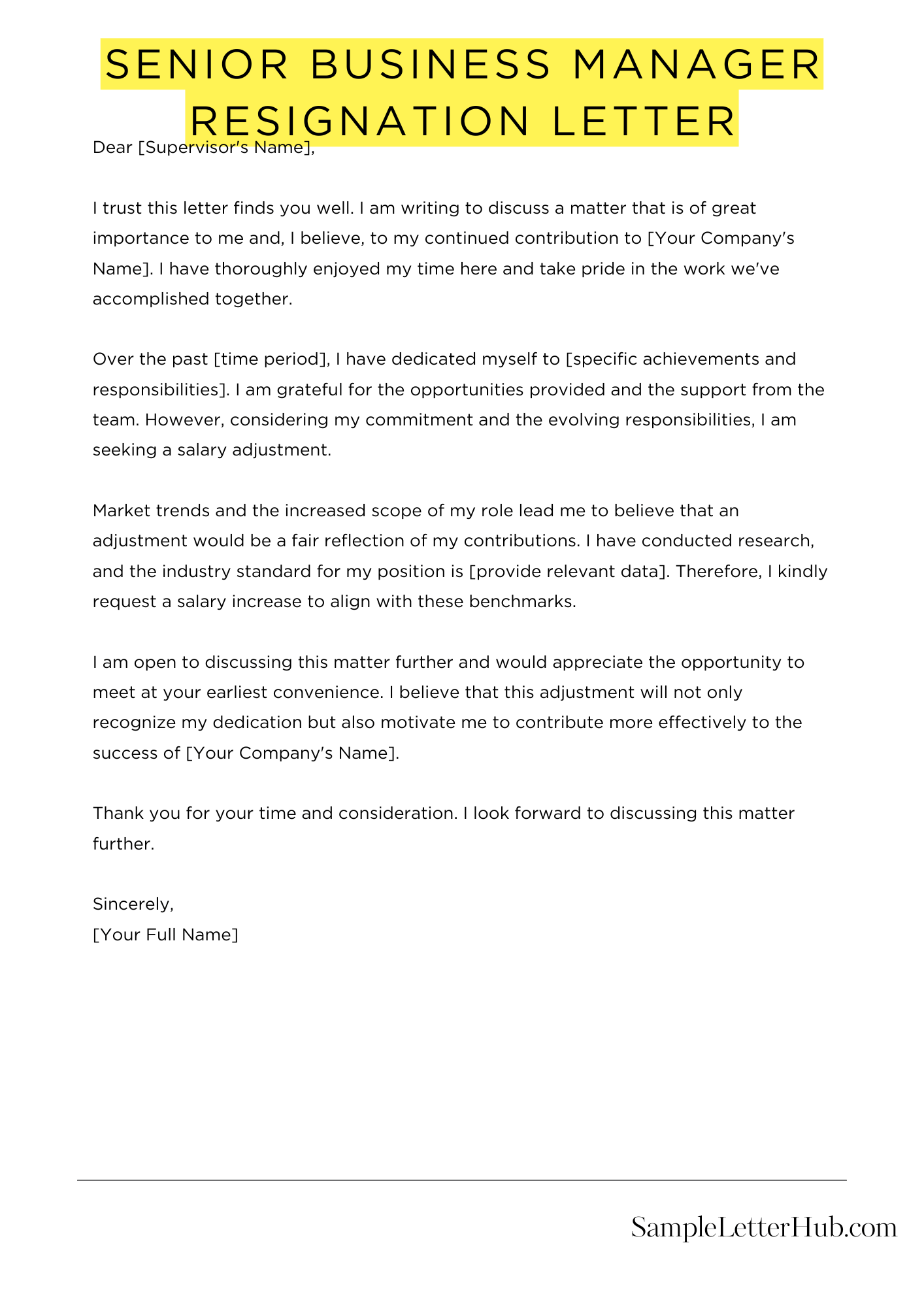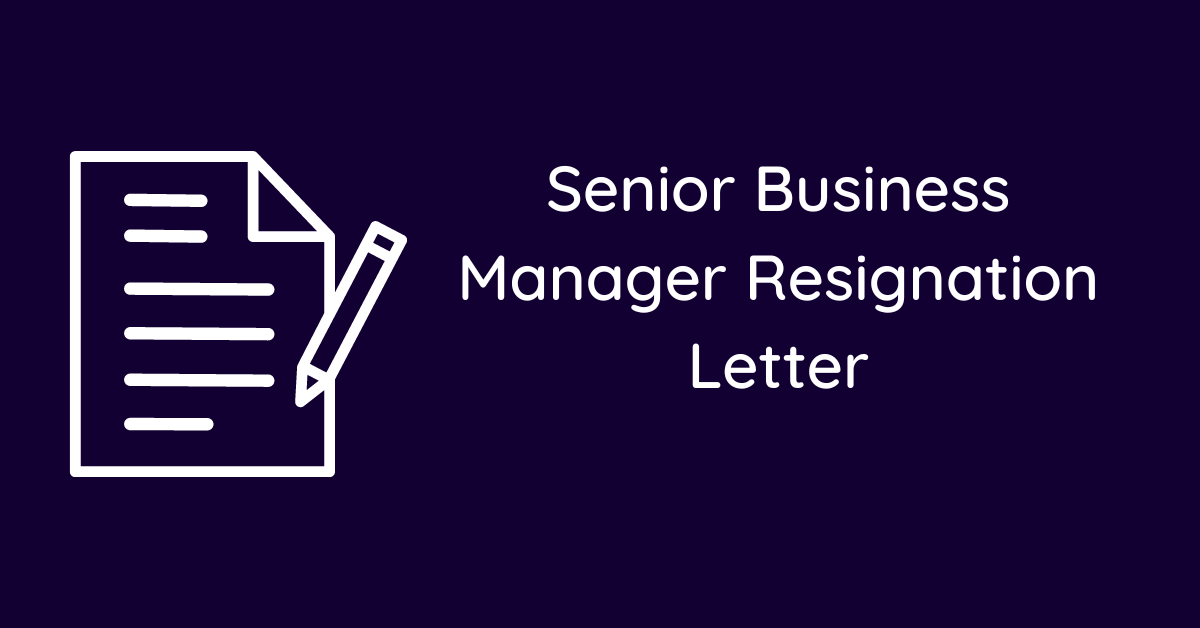When it comes to leaving your role as a senior business manager, it’s important to do so professionally and respectfully. One way to do this is by writing a clear and concise resignation letter. In this blog post, we’ll share an example of a senior business manager resignation letter that you can use as inspiration.
When writing your resignation letter, be sure to be polite and humble in your tone. Thank your employer for the opportunity to work at the company and express your appreciation for their support. It’s also important to be clear about your reasons for leaving, but be brief and professional. You don’t want to burn any bridges on your way out.
Below, we’ve included a template for a senior business manager resignation letter that you can use as a starting point. Feel free to adapt it to fit your own circumstances.
Senior Business Manager Resignation Letter
Dear [Recipient Name],
Please accept this letter as formal notification that I will be resigning from my position as Senior Business Manager at [Company Name], effective two weeks from today, [Date].
During my tenure, I have valued the opportunities and experiences I have gained within the organization. I am grateful for the support and guidance I have received from my colleagues and superiors.
I wish [Company Name] all the best in its future endeavors.
Sincerely,
[Your Signature]
Short Senior Business Manager Resignation Letter Sample
Please accept this letter as formal notification that I am resigning from my position as Senior Business Manager at [Company Name]. My last day of employment will be [Your Last Day]. Thank you for the opportunity to grow and learn during my time here. I wish you and the company continued success. I am happy to assist in the transition process to ensure a smooth handover of my responsibilities.
I wish you all the best with your senior business manager resignation letter.
When it’s time to say farewell, expressing your gratitude and best wishes can make the transition smoother:

How to Write a Senior Business Manager Resignation Letter
Craft a Clear and Concise Opening
Begin your letter with a formal salutation, followed by a direct statement of your resignation. Clearly state your last date of employment and express your gratitude for the opportunity to work at the company.
Highlight Your Accomplishments
In a brief paragraph, summarize your key accomplishments and contributions during your tenure. Be specific and quantify your results whenever possible. This will demonstrate your value to the organization and leave a positive impression.
Express Your Appreciation
Take the time to express your sincere appreciation for the support and guidance you have received from your colleagues and superiors. Mention specific individuals or teams that have had a significant impact on your professional growth.
Offer Assistance with the Transition
Demonstrate your commitment to a smooth transition by offering to assist in any way possible. This could include training your replacement, providing documentation, or participating in handover meetings.
End with a Professional Closing
Conclude your letter with a formal closing, such as “Sincerely” or “Respectfully.” Include your full name and signature below the closing.
6 Most Frequently Asked Questions About Senior Business Manager Resignation Letters
When it comes to writing a resignation letter for a senior business manager position, there are a few key things to keep in mind. Here are the six most frequently asked questions about senior business manager resignation letters, along with their answers:
1. What is the proper format for a senior business manager resignation letter?
A senior business manager resignation letter should be formal and concise. It should include your name, position, and the date you are resigning. You should also state your last date of employment and offer to help with the transition.
2. What should I include in the body of my resignation letter?
In the body of your resignation letter, you should express your gratitude for the opportunity to work at the company. You can also mention your accomplishments and how you have contributed to the company’s success.
3. Do I need to give a reason for my resignation?
You are not required to give a reason for your resignation, but it is customary to do so. If you do choose to give a reason, be brief and professional.
4. How much notice should I give?
The amount of notice you should give depends on your company’s policy. However, it is generally considered good practice to give at least two weeks’ notice.
5. What should I do if I am asked to stay?
If you are asked to stay, it is important to be polite and professional. You can explain that you have already made up your mind to leave and that you appreciate the offer.
6. What are some tips for writing a strong resignation letter?
Here are a few tips for writing a strong resignation letter:
- Be clear and concise.
- Be professional and respectful.
- Express your gratitude for the opportunity to work at the company.
- Offer to help with the transition.
- Proofread your letter carefully before submitting it.
Before making the decision to resign from your job, it’s essential to consider the legal aspects:
Understanding your emotions after quitting your job is important. Explore why you might be feeling sad:
Related
- Resignation letter sample
- Forced resignation letter
- Resignation letter due to going abroad
- Resignation letter due to marriage
- Resignation letter due to other opportunity
- Resignation letter due to mistake

